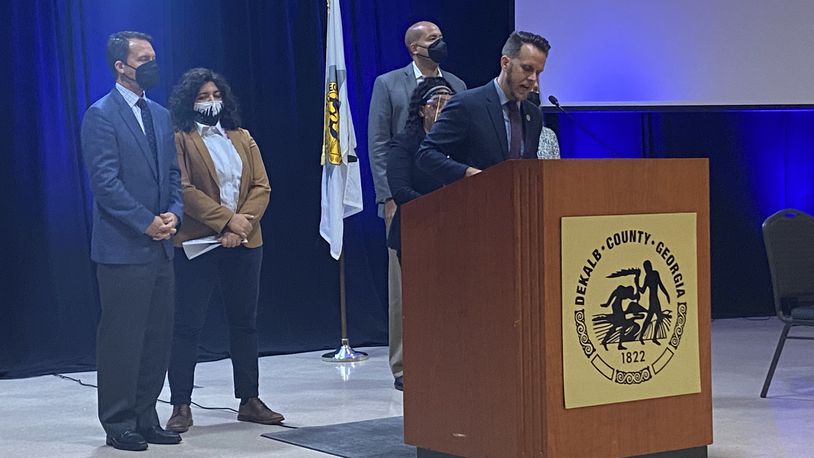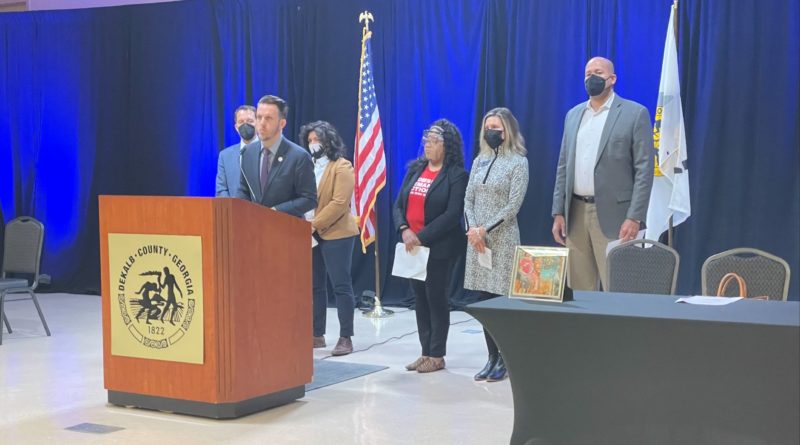Originally published in Decaturish

Decatur, GA — Decatur Mayor Patti Garrett and local leaders, including DeKalb Commissioner Ted Terry, celebrated the federal investments being made in Georgia related to clean energy during a press conference on April 11 at the Decatur Recreation Center.
Georgia has been allotted about $83 million in federal funding through the Inflation Reduction Act and the Infrastructure Investment and Jobs Act. Local cities and counties like Decatur and DeKalb County haven’t received federal funds yet, but can apply for grants through various agencies like the United States Environmental Protection Agency, the state Environmental Protection Division and the U.S. Department of Agriculture.
According to a press release, these investments will improve energy efficiency, accelerate the transition to a clean energy economy, and lower energy costs for Georgia families with the Weatherization Assistance Program (WAP).
“I am thrilled to celebrate these historic federal clean energy investments that will advance our plans to cut pollution, lower our operational costs, and lower energy costs for our communities,” Garrett said in the press release. “Decatur has ambitious sustainability goals to meet in the coming years, including a total transition to clean energy for our municipal and community buildings, and weatherization efforts that reduce energy usage are key to meeting our targets and making our communities more resilient to a changing climate.”
Decatur is developing a comprehensive strategy to utilize federal funds, mobilize the community, and implement clean energy measures. The city of Decatur recently adopted its clean energy plan, which sets goals for the city to transition away from fossil fuels and toward a resilient, renewable future.
“This document, Decatur’s Clean Energy Plan, is intended to guide Decatur’s energy transition and address the city’s contributions to the climate crisis while also improving living conditions and addressing equity issues,” the executive summary of the plan states. “This plan describes a path to a Clean Energy Future while facing an aggressive goal and conditions outside of Decatur’s control.”
When the city was working on the 2030 Strategic Plan, climate action became a top priority.
“Acting on a key recommendation of the city’s clean energy plan, the city is working to create a community energy fund to complement the available federal funding to support low and moderate income households and their ability to take advantage of these programs,” Garrett said during the press conference.
Every year during the city’s Martin Luther King Service project, volunteers do minor repairs on homes of seniors and part of that includes weatherization.
“We want to expand that program and also work with our land trust to be able to make sure we’re meeting the needs in the community that don’t have access to the funding for putting in insulation or replacing systems and those kinds of things. We’re using the time now as grants are being released [to see] what are we a city eligible for,” Garrett said.
During the press conference, speakers highlighted how federal funding will address the needs of communities with access to fewer resources.
“Today, we’re shining a light on a critical component of Georgia’s plans to significantly reduce our energy consumption, and create a lifeline for many through efficient, effective home weatherization,” Terry said in the press release. “The expansion of programs like WAP, which help low-income families reduce their energy bills, will have a profound impact on those communities that are on the front lines of a housing crisis and facing increasing costs to cool and heat their homes.”
Weatherization is a key aspect of the Inflation Reduction Act and the Infrastructure Investment and Jobs Act, Terry said during the press conference.
“It’s the process of making homes and buildings more energy efficient, which in turn reduces the amount of energy required to heat and cool them,” Terry said. “It’s achieved through a combination of very basic things, including sealing air leaks, insulating walls and attics, and upgrading the heating and cooling systems. The benefits of weatherization are numerous. For one, it saves homeowners money on their energy bills.”
He added that weatherization reduces one’s carbon footprint and creates jobs as it requires skilled professionals to carry out the work.
“Finally, it’s not just about saving money or reducing our impact on the environment, it’s also a matter of social justice,” Terry said.
Local funding through DeKalb County and the American Rescue Plan Act has gone toward weatherizing homes in Clarkston and South DeKalb. The Empower Clarkston program, which is run through the Tekton Training Center, has been expanded with help from the county’s APRA funding.
“The program is aimed at training refugees from the immigrant community as well, and communities that have been impacted by COVID-19,” said Malek Alarmash, program manager at Tekton Training Center. “The training program focuses on trade skills and includes specialized trainings such as the Empower Clarkston program.”
The 14-week program is centered around green construction and efficiency training, which includes identifying and addressing energy needs and plumbing issues. In 2021, the Empower Clarkston program trained 15 people and assisted 15 homeowners.
“The program’s impact was demonstrated through data which showed a significant reduction in power bills and amounting in approximately $700 in energy savings per year. This represents a significant cost savings of more than 33%,” Alarmash said.
Tekton will be working on 20 homes in DeKalb and has been recruiting trainees and homeowners to participate in the Empower Clarkston program.
The Rev. William Flippin Jr., added that weatherization is a critical tool in fighting climate change, and it improves the wellbeing of communities by reducing greenhouse pollutants.
“Legislation that expands and makes these energy efficiency efforts accessible to all is the inclusive and expansive approach that we need to meet the climate change challenge,” Flippin said.
In addition to highlighting the tangible benefits realized in these laws, speakers also urged federal leaders to further expand on them to reduce carbon pollution.


